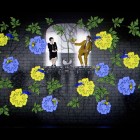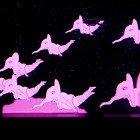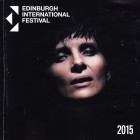Zauberflöte 2015Komische Oper, Berlin
Read more about the opera Magic Flute
While London struggles to sustain a second opera company, and Scotland can barely support one, pity the poor Berliners, who must make do with three. Before the removal of the Wall a quarter-century ago, the Komische Oper was one of two companies in the East. It must be said that in reputation it rather outshone the larger Staatsoper, largely due to the long period in which it was directed by the great Walter Felsenstein. With many hours of rehearsal time at his disposal, and substantial funding, he produced a broad range of works, including rareties such as The Cunning Little Vixen and Offenbach's Bluebeard.
Since his death and the great political changes in Europe, the stock of the Komische Oper has fallen significantly. The recruitment in 2012 of Australian Barrie Kosky to lead the artistic side may have been seen as a last ditch attempt to save the company from destruction. If so, it seems to have worked, and this visit to Edinburgh showed us a rejuvenated enterprise apparently at the top of its game.
Certainly this Flute production was hugely entertaining and extremely funny. Reports from the opening night told of audiences laughing uproariously from the start and scarcely letting up, and that was the general experience of the third performance too. The stage space was tiny - the full width and height of the proscenium were filled with a white screen containing six apertures, the doors to which rotated quickly, revealing singers securely strapped in while they sang, before vanishing as quickly, They were frequently high above the pit. The stage was very shallow, and all the visual interest was provided by animation sequences of quite extraordinary accomplishment and virtuosity projected on to the screen, with which the singers were able to interact to a limited degree. The idea was to use the silent films of the twenties to provide visual influences. The dialogue was cut, as done by Peter Sellars back in 1990, to be replaced by captions in German, themselves then supertitled into English. Many visual references worked wonderfully - early on, the dragon ran round, was chased, and eventually slain, by squadrons of arrows despatched by the ladies. Monostatos had a pack of salivating dogs or wolves - very fierce looking, and his make-up was derived from Nosferatu. Papageno's refreshment was an intoxicating cocktail that immediately gave him hallucinations (rather strange flying pink elephants). The trials by fire and water were highly effective - a descent to the bowels of the earth through stratified layers of skeletons - human, then early mammals, then dinosaurs. Indeed throughout, the animated animals were wonderful, with clockwork interior mechanisms visible, and stylishly differentiated movements for monkeys, ostriches, and so on.
Many aspects were less successful. The musical performance was generally fine, but it seemed to be in a bit of a straitjacket becasuse of the need to time the visuals. The Queen appeared right from the start as a nasty spider - no ambiguity about her character at all. Pamina's silent movie reference was Louise Brooks, but she therefore appeared in the most notorious Brooks role, Lulu in Wedekind's Pandora's Box - it was difficult to be optimistic about Tamino's future married life. One animation did not work at all - the flute was represented by a twee, Disneyfied, indeed thoroughly kitsch fairy - perhaps Tinkerbell from Peter Pan. Worse, the audience actually laughed during both Sarastro's 'O Isis und Osiris' and the Queen's 'Der Hölle Rache'.
The cast was largely unfamiliar to Scottish audiences. Allan Clayton is one of the best of the current generation of British tenors, and sang with a lovely sense of phrasing. As with most of the singers, acting was not really required, rather the ability to co-ordinate his actions with the animation going on around him. The bass Dmitry Ivashchenko sang Osmin with Scottish Opera back in 2007, and his voice has a lovely dark, velvety quality. He doubled as the Speaker (the excision of dialogue meant goodbye to the subsidiary priests and to most of Papagena's role).. Yhe coloratura soprano Olga Pudova was a student at Rostov-on-Don, and came to Glasgow in the first of the exchanges with the Conservatoire. She sang in the student production of Massenet's Cendrillon, and has retained the effortless technique while developing an effective dramatic power.
Dominik Köninger made an endearing Papageno in Buster Keaton style, while Maureen McKay also sang beautifully, though her great lament made little impression. Peter Renz was a superbly nasty Monostatos, though his Nosferatu make-up was also slightly reminiscent of the late Ronnie Barker. The trio of boys, picked from a touring squad of six members of the famous Tölz Boys Choir, were as good as you are likely to hear.
The fundamental problem with this was simply that the concept swamped too many elements of the actual work. Mozart is great enough to survive, but it was sometimes a close thing. Nor was the use of the wonderful C minor Fantasia an appropriate accompaniment to the silent movie actions. One person leaving the theatre was heard explaining the plot to a friend - perhaps understandable at half time, but surely not at the end. And this particular audience member simply found the whole experience overwhelming, exhausting and headache-inducing. Sadly, it was not possible to lie down in a darkened room afterwards, when a train had to be caught.
Performance Cast
- Tamino a Prince
-
Allan Clayton (Aug 27, 29)
Jussi Myllys (Aug 28, 30)
- First Lady in attendance on the Queen
-
Nina Bernsteiner (Aug 27, 29)
Mirka Wagner (Aug 28, 30)
- Second Lady in attendance on the Queen
-
Karolina Gumos (Aug 27, 29)
Theresa Kronthaler (Aug 28, 30)
- Third Lady in attendance on the Queen
-
Ezgi Kutlu (Aug 27, 29)
Nadine Weissmann (Aug 28, 30)
- Papageno a bird-catcher
- Queen of Night
-
Olga Pudova (Aug 27, 29)
Beate Ritter (Aug 28, 30)
- Monostatos a servant in the Temple
-
Peter Renz (Aug 27, 29)
Johannes Dunz (Aug 28, 30)
- Pamina daughter of the Queen of Night
-
Maureen McKay (Aug 27, 29)
Adela Zaharia (Aug 28, 30)
- Speaker at the Temple
-
Dmitry Ivashchenko (Aug 27, 29)
Bogdan Talos (Aug 28, 30)
- Sarastro High Priest of Isis and Osiris
-
Dmitry Ivashchenko (Aug 27, 29)
Bogdan Talos (Aug 28, 30)
- Papagena disguised as an old woman
- First Armed Man
- Second Armed Man




